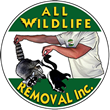Wildlife removal and prevention is always important. For obvious reasons you never want to have wild animals invade your home. On top of becoming a source of unwanted stress, there is also the potential damage and the costs associated with any repairs and remediation. Wildlife removal and prevention is especially important during the winter season. Because of the colder weather and a shortage of food, animals are forced to seek alternatives in order to survive. Often times this means moving into populated areas.
Do you need wildlife removal services? Request a quote today!
Shelter
 As the weather starts to dip, all species of urban wildlife will begin searching for a warmer place to spend the colder months. There are several options for this out in the wild, but when it comes to urban areas, more often than not the animals end up in a man-made structure. Of course, wildlife will avoid humans at all costs and choose empty buildings as often as possible. But due to the sheer number of animals found in any residential area; it’s only a matter of time before these critters encroach on our living spaces.
As the weather starts to dip, all species of urban wildlife will begin searching for a warmer place to spend the colder months. There are several options for this out in the wild, but when it comes to urban areas, more often than not the animals end up in a man-made structure. Of course, wildlife will avoid humans at all costs and choose empty buildings as often as possible. But due to the sheer number of animals found in any residential area; it’s only a matter of time before these critters encroach on our living spaces.
Let’s just hope it’s not in your attic or walls. Your home can seem like that ideal hideaway to all sorts of wildlife. Since we turn the heat up in the winter, our homes are the warmest places around, and animals really enjoy being warm. It stands to reason that as the temperature drops, the motivations for all types of species to break into your attic or garage and find some shelter.
The most common critters you will come across in an urban setting are the following:
- Mice – due to their ability to breed rapidly, it is in your best interest to address any signs of mouse presence urgently. If left for even a few months you could be dealing with an infestation.
- Raccoons – because of their size and the fact that they will have their liters wherever they call home for the winter; you definitely need to address this issue as soon as you become aware. The good news is they are not very subtle, you will know if they have moved in.
- Squirrels – their teeth never stop growing, hence, they never stop chewing. Over time the damage will be significant. Another consideration is the risk of a squirrel chewing on some wires and doing further damage or starting an electrical fire. Act quickly if their presence is detected.
Food
In the winter, food is much harder for animals to find. Many animals (like squirrels) will have stored food away to tide them over for the winter, but many other animals have not.
Your home is not only warm but also full of food, and it smells like it. Hungry animals are more desperate to get into your home, which is why animal prevention is especially important during the winter.
Sick Animals
Since food is scarce on the ground in winter, animals will probably not be eating as well as usual. They’re also going to be cold. These two factors can very easily lead to animals getting sick. You don’t want animals in your home at all, but you most definitely don’t want sick animals trying to get in. They can potentially pass along a sickness to any pets you have or to you or your family as well.
A sick animal also loses its fear of humans. When animals aren’t afraid of you, they’re likely to be more aggressive and also harder to get rid of.
Animals Are More Determined
In the winter, because of the facts mentioned above, animals are much more determined to get into your home because their survival could depend on it. They’re cold, hungry and desperate. This combination makes for a situation that you don’t want in your home. It’s important, therefore, to do what you can to keep animals out.
Keeping Wildlife out of Your Home
Keeping animals out of your home can be challenging, which is why it’s so important for you to be proactive in your approach.
- Check the exterior so you can spot any holes or cracks that need to get fixed.
- Check doors and windows because there might be cracks around the frames that animals can squeeze into.
- Check screens on windows. Make sure there are no rips in them, and if you don’t have screens, put some on.
- Look in the attic because it’ll be easier to spot smaller holes from within the attic than to climb on the roof.
- Keep garbage cans secure so animals can’t get into them for food. You want to make it as hard as possible for animals to find food and shelter in and around your home so that they don’t have any reason to linger.
- Conduct regular checks of your home because things change and holes and cracks can appear over time. You want to be mindful of your property and vigilant about it and any animals you see.
Wildlife removal and prevention is always important, but it’s vital during the wintertime. Animals are more determined to get into your home, so you need to be constantly on guard.
Do you need wildlife removal services? Request a quote today!
